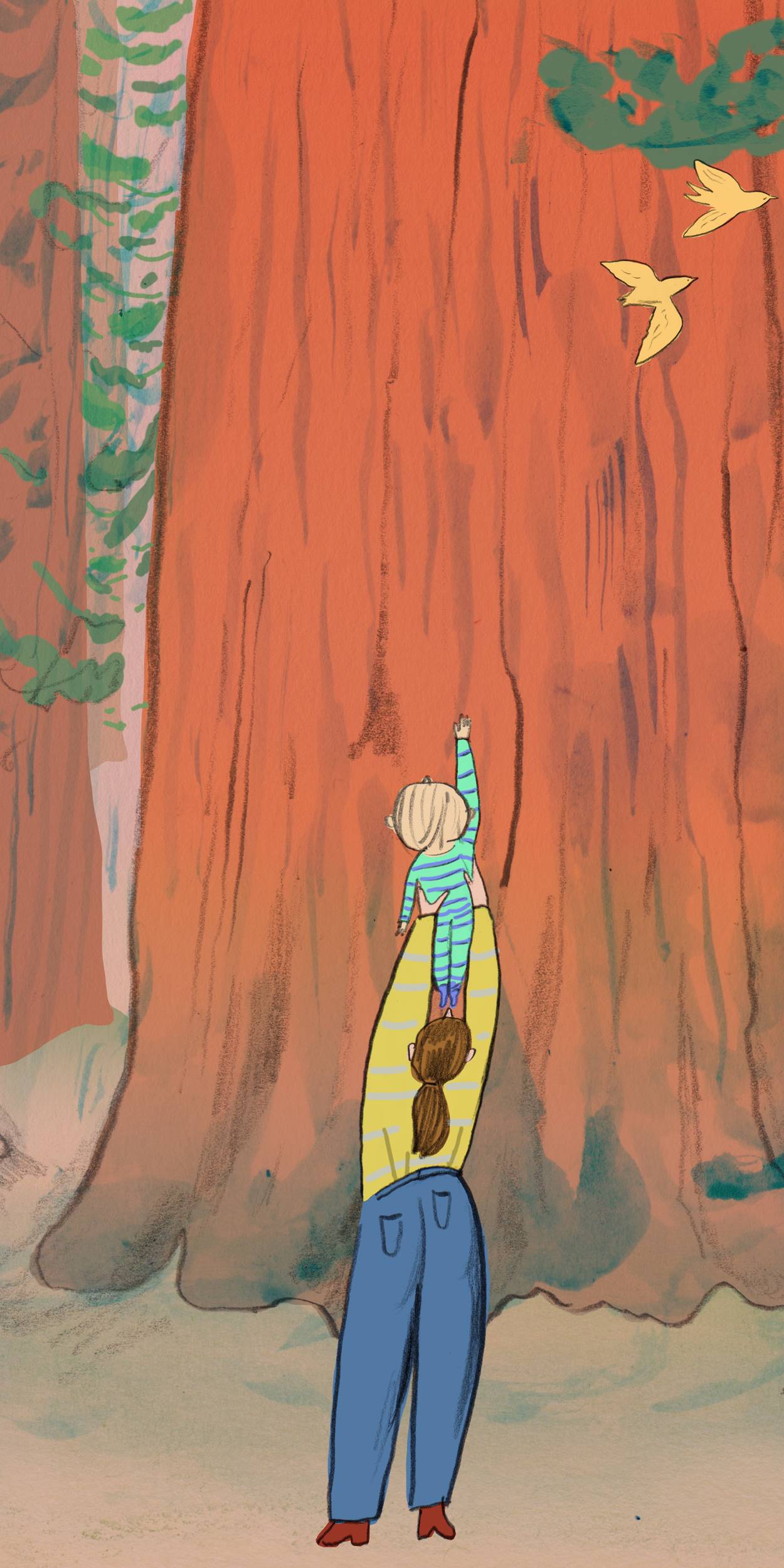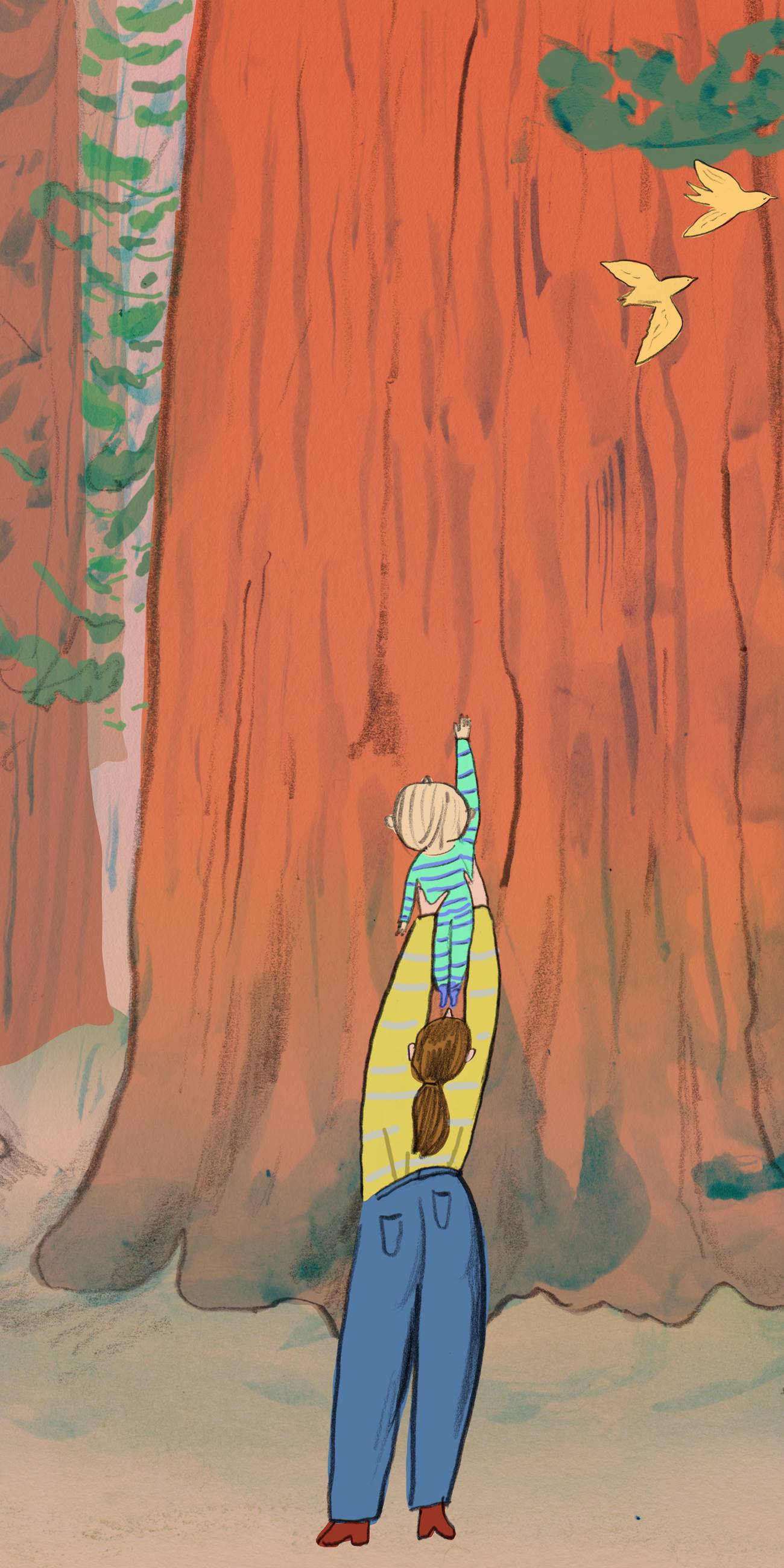Becoming a Mom During the Climate Crisis
A rabbi and activist weighs her decision




The planet was my first love. In third grade, I stared at a poster of the Earth in space like it was a celebrity crush, swirls of blue, white, and brown standing out starkly against the black. While my friends talked about TV shows or new games, I daydreamed of tree-sitting to protect a forest or sailing with Greenpeace between the harpoon and the whale. I imagined I would die for the Earth, if given the chance.
“I want to be an environmental activist when I grow up,” I told my class. I didn’t divulge my true plans: I would lead the rebel movement to stop the clearcutting, the garbage barges, the smokestacks. I would earn God’s approval for completing a sacred mission. As a consuming, polluting human, I would earn Earth’s forgiveness for the sin of being born.
After decades of false starts, I finally found my momentum as a climate activist in my mid-30s. I spent four years juggling rabbinic jobs with risking arrest, organizing campaigns, and leading songs at marches. I became close friends with several faith-based activists who had decided never to have children. They weren’t trying to make a statement about population growth; they were just compelled to do activism at an intensity that parenthood would make impossible. Next to them in the streets, I felt the isolation I’d known in childhood melt into solidarity and connection. Incongruous to the crisis we faced, I felt wildly, vibrantly happy in this new community.
Having a baby four-and-a-half years ago stopped all that midstride.
I knew that in the short term, becoming a mother would make me less able to be an activist. But I imagined that after 12 weeks of maternity leave, I’d be back at my pulpit and marching in the streets. In reality, I spent the first two years of motherhood flattened by waves of debilitating postpartum anxiety and depression. I took a leave from work and then returned part time, only to resign a year later. I said no to almost every invitation to sing, speak, or sit in. Grasping for rest and miniscule moments of calm, I was cut down to my most essential mammalian self: drink, eat, sleep, nurse, bond with my child. Do my best not to let a certain presidency ransack what was left of my mental health.
“Thank you for going,” I texted my friend, last October. She was headed to Washington, D.C., to join a week of climate protests in solidarity with indigenous nations. I, in contrast, was heading to my son’s preschool. How could I have ended up here, driving my hatchback to pickup while the heartbeat of the climate movement was on the streets of our nation’s capital?
Pulling my purse from the closet I noticed my “activist tallit”—the prayer shawl I bought seven years ago and wore during climate actions to signal my identity as a Jew and rabbi. It hung limply next to the off-season coats. I grabbed my phone again. “Please represent me,” I texted. “I wish I could be with you.”
After my husband and I got married, we talked about having a child—a lot. We both felt called to public careers. We both needed time to write, and to hunker in our respective introvert caves. In addition to the immediate familial upheavals, a child would be born into an unraveling biosphere, would account for a massive amount of greenhouse gas emissions, and would take me away from frontline activism, during the ever-closing window of time we had to avert the worst of climate change. Jewish culture and tradition celebrate—even command—bringing life into the world, but what does that mean when the world itself is less and less able to support life?
But on the other side of the equation, there was something that blew out the scale. I just couldn’t name what it was. A year after our wedding, I sat in an armchair strumming a ukulele in a Vermont rental home, while my parents and sisters played guitar, piano, two fiddles, and a cello between them. We hit a flow state together and jammed for hours. The light streamed in the windows from behind the spruce trees. The wooden walls glowed and hummed. As my endorphins surged, I made my decision. I wanted to add another person to our family, to a world where music and mountains and joy like this existed.
My husband and I asked God for a child on Yom Kippur, the holiest day of the Jewish year. I prayed every day for my friends who were trying to conceive, and for myself. I diligently clocked my cycle, and during those interminable two-week stretches of waiting, my stomach fluttered with nerves. And yet some nights I would lie awake crying into my pillow, addressing the Earth herself. “How could I betray you by having my own child? Aren’t there too many of us for you? How could I abandon my calling?”
“It’s a sign of faith in a livable future,” an activist friend responded after I sent out an email announcing my pregnancy. But was it? Or was it just a sign that I was the kind of person who would get pregnant at the end of the world?
Having a baby in the United States was the most radically selfish thing I have ever done. Even though systemic emissions reduction is what matters, it’s still true that having a child will be the single biggest contribution I make to greenhouse gases and resource extraction, and it has put another person in the way of climate disaster. Especially after the Dobbs decision, I will always passionately support the right of anyone to not become a parent. But I must bear witness to this remarkable paradox: Having a baby in the era of climate collapse was the most radically selfish thing I have ever done and also the most astonishing act of love and faith I have ever undertaken.
Am I afraid of my child suffering? Yes. Am I afraid of failing at the sacred mission to which I swore allegiance in third grade? Absolutely. But in those first years of vibrant activism, I had stumbled into a surprising ray of grace, an astounding liberation: I had begun to accept that my saving the world was impossible, and that the only sane and sacred choice was to keep showing up to the fight anyway, with the gifts I could offer in any given chapter of my life.
Perhaps the Earth did not actually want me to prostrate myself in terror and martyrdom for her sake. Perhaps—how extraordinary indeed—she loved me back. Perhaps my having a child could be a celebration of that love. Perhaps becoming a mother would also be transformative for my activism—not right away, but eventually.
Great love and communal heartbreak walk hand-in-hand in our house now, like two invisible sisters. At dinner the other night, my son asked when he would get on an airplane for the first time. I haven’t been on a plane in five years, as a matter of principle. But I’ve been thinking about a trip west. I want to see the giant sequoia groves. I want to see them while they are still here before droughts and fires kill the surviving ancient trees. I said some of this aloud and my sweet 4-year-old who loves trees and knows them by their names, who grieved the death of our eastern hemlocks taken by the wooly adelgid and wept when a freak early snowstorm injured our eastern redbud, turned sheet white. “What you mean, Mama? What you mean while the sequoias are still here?”
I imagine the future when, grasping the magnitude of hurt in this world, he will ask the even more harrowing question: How could you? I hear the wisp of an answer growing like the bean sprouts we planted this summer, tendrils of words reaching out, testing the air. Yes, I imagine saying to him, we knew about the droughts and fires, the famines and extinctions, the storms, and floods. And still we summoned you here to Earth, not—please my child, not ever—because we wanted you to save us. But because we love being alive and we wanted to share that with you. And because there is a great, deep, awesome, and abiding love on the other side of the equation that holds us every day—and will hold you, too.
I park and walk to the pickup area and see him running up and down the little hills in the playground, purple backpack and black curls bouncing. He runs to me and in the weight of his body against mine, I feel my roots sinking into the Earth, coming home, again. Feeling an ultimate forgiveness, not for the sins of my species, but for my mortality and limits. Knowing that, like my son, I am worthy of love and belonging not because I will save this beautiful world, but because I am a part of it.
Shoshana Meira Friedman is a rabbi, writer, mother, and climate activist in Boston.